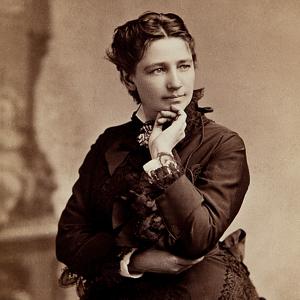Information
Early Life
Victoria Woodhull was born on September 23, 1838, to a poor family in Homer, Ohio. When she was 15, Victoria married an abusive alcoholic who failed to support her and their two children. In 1864, for these reasons, she left him, even though divorce was considered scandalous at the time. Throughout the 1860s, Victoria Woodhull would rise up in the ranks of society through hard work and smart investments, opening the first female-run brokerage firm on Wall Street in 1870, with her sister Tennessee.

Accessed via www.womenshistory.org
Activism
Using this newfound success, Victoria and Tennessee started publishing a newspaper called Woodhull and Claflin's Weekly. This newspaper discussed topics such as women's suffrage and political reform (notably publishing the first English copy of the Communist Manifesto). It also supported "free love", the idea that a woman should not have to stay in a marriage if she was not happy. While this may seem normal today, it was highly controversial at the time, and sparked large public pushback, including a memorable cartoon by Thomas Nast where Victoria was depicted as "Mrs. Satan." In 1870, Victoria Woodhull announced her run for President, stating in a letter to the New York Herald that "I have deliberately and of my own accord placed myself before the people as a candidate for the Presidency of the United States, and saving the means, courage, energy and strength necessary for the race intend to contest it to the close." In 1871, she reached the arguable highest point of her career in activism, being the first woman to testify before a committee of the US house of Representatives. Alongside suffragists Susan B. Anthony and Isabella Beecher Hooker, Victoria expressed her view that women should already have the right to vote due to the 14th and 15th amendments granting suffrage to all US citizens.

Pushback
However, during this time period, Victoria Woodhull suffered a scandal that would put an end to her political career. Her newspaper published an account of the extramarital affair of Henry Ward Beecher, a minister who was a prominent critic of the ideas expressed in Woodhull and Claflin's Weekly. Due to censorship laws at the time, and her growing unpopularity with the public, the scandal blew up into a lengthy legal battle that culminated with Victoria Woodhull being incarcerated during Election Day. This election was, after all, mainly a publicity stunt as she did not receive many voters, she was below the age of 35, and her supposed running mate, Frederick Douglass, was not even aware of his candidacy when it was first announced. Despite the anticlimactic ending of her historic 1872 run, Victoria Woodhull's life, activism, and revolutionary ideas were important to the fight for women's suffrage, as well as the greater women's rights movement. And despite her run for president failing in the end, Victoria is still credited as one of the first American women to break the "glass ceiling" of politics.